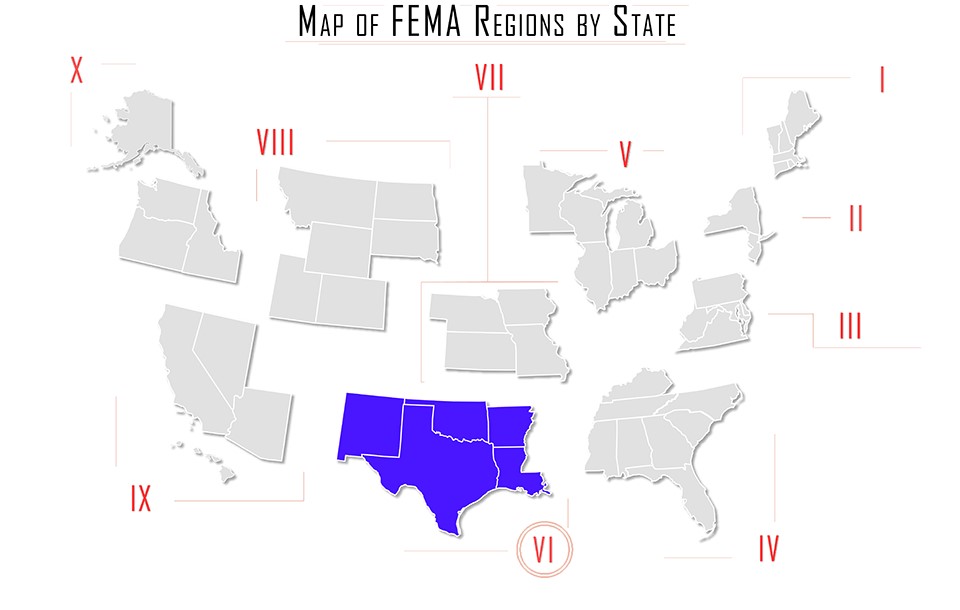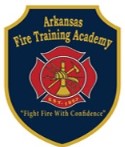.png)
At the Region is an ongoing feature that discusses the state-by-state training, certification and employment requirements of first responder departments across the nation. In this issue, At the Region looks at requirements for firefighters in FEMA Region VI: Arkansas, Louisiana, New Mexico, Oklahoma, and Texas.


Arkansas
The Arkansas Fire Training Academy at Southern Arkansas University Tech, is accredited by the International Fire Service Accreditation Congress (IFSAC) and the National Board on Fire Service Professional Qualifications (NPQS or Pro-Board) to certify personnel to the Firefighter I, Firefighter II, Driver/Operator, Hazardous Materials-Awareness, Hazardous Materials-Operations, Instructor I and Fire Officer I & II levels.
Minimum requirements to become a firefighter in Arkansas include:
• Be at least 21 years old
• Have a high school diploma or equivalent
• Pass a background check and a physical exam
• Have no felony convictions
• Have acceptable vision (uncorrected visual acuity must not exceed 20/50 in either eye, correctable to 20/20 in the stronger eye and 20/30 in the weaker eye)
• Be a United States citizen by date of hire
• Be in good physical condition
• Be of good moral character
• Obtain or hold a valid Arkansas Class D Driver’s License by date of hire
• Successfully complete all required Selection Procedures.
Arkansas cities may add additional requirements. For instance, Little Rock requires that candidates meet the following:
• Be at least 20 and 1/2 years of age but less than 35 years of age* by the date of the written examination. No person shall be hired as a Firefighter who has not arrived at the age of 21
• Any applicant who arrives at the age of 35* during the selection process shall be immediately disqualified and will not be eligible to receive an offer of employment
They do make an exception for maximum age though, as any person who has:
• at least two (2) years of previous experience as a paid firefighter with another fire department and whose years of experience as a paid firefighter when subtracted from the person’s age leaves a remainder of not more than thirty-two (32) years shall be eligible.
You must first become a volunteer firefighter and then you can attend the Fire Training Academy to become a fully certified firefighter.
Reciprocity
It is unclear if the State of Arkansas offers reciprocal certification for equivalent training in another state.

Louisiana
Louisiana is interesting because the parishes decide the standards for becoming a firefighter. The baseline prerequisites include:
• Being over the age of 18,
• Reside within reasonable proximity of local fire station
• Pass a medical exam
• Hold a valid driver’s license and Social Security card
• Have a clean criminal history
Louisiana considers both firefighters and police officers in the same group of civil servants. Louisiana also uses a scheme of categorization that breaks individual departments down into either civil servant departments or non-civil servant departments. Applicants to become firefighter submit an application to the municipal service board in the town where they want to work. The board reviews applications and approves or disapproves. Those whom are approved get to take an Entrance Firefighter Exam. The exam is competitive and is handled by the Office of State Examiner Municipal Fire and Police Civil Service (OSE). It is not necessary to take the exam in the jurisdiction in which you want to work, but you must meet the requirements for the exam in the jurisdiction in which you take it. The OSE website offers great information for those wishing to apply. Here you can find applications, study guides by jurisdiction, points of contact for municipal service boards, and other great information. Make sure you read through the website thoroughly before making application.
Reciprocity
The Louisiana State University Fire and Emergency Training Institute handles reciprocity. Reciprocity applications are only accepted for applicants who are currently working for a Louisiana Fire Department, so go get hired first. Certifications that meet the requirements that the LSU program follows will be processed. Those that don’t meet the requirements will not be processed. There is a $30.00 fee payable upon approval of certification.

New Mexico
The New Mexico Fire Training Academy handles certification for the state. The Academy's certification programs are accredited by the International Fire Service Accreditation Congress. The minimum requirements to be eligible to become a firefighter in New Mexico include:
• Be at least 18 years old
• Have a valid driver’s license
• High school diploma or GED
• U.S. citizenship or legal residency
• Pass a written exam
• Pass a complete medical checkup (most often CPAT) and complete drug screen
• Face-to-face interview with hiring authority
Some New Mexico departments require firefighters to also hold EMT (minimum) licensure by the end of the recruitment period. Only EMT certification training from New Mexico or the National Registry is accepted. Also, applicants must pass Hazardous Materials, Basic Firefighter Emergency Medical Services, Incident Command and Wild land Firefighting for admission into the State Firefighters Training Academy.
Reciprocity
The training academy may issue reciprocity if:
• Applicant is a current resident of New Mexico and/or a member in good standing of a New Mexico Fire Department
• A copy of the certificate with an IFSAC seal and authenticating number verifies current certification. The seal and number must be readable and intact
• Applicant must submit documentation verifying completion of any prerequisites required by the New Mexico Firefighters Training Academy for the occupational level in which reciprocity is sought
• The occupational level of the applicant’s current certification must also be accredited in New Mexico by IFSAC.
Candidates who failed either a written or skills New Mexico certification exam earlier will not be considered for reciprocity. Reciprocity will only be granted for the NFPA edition of the original certificate. Reciprocity will only be considered for the last two revision cycles.
For reciprocity consideration, a reciprocity application, the applicable fee, and supporting documentation for prerequisite satisfaction must be submitted for review. The applicant will be notified in writing of the decision.

Oklahoma
Although standards may vary by department, generally applicants to become a firefighter in Oklahoma must:
• Be at least 18 years of age
• Hold a valid Oklahoma driver’s license
• Pass a background check
• Have a high school diploma or GED
• Must live within a 30-minute drive of their local fire department
Applicants must also pass a written examination that assess basic reading and math skills. Some departments may give former service members with honorable discharges and active-duty reservists or National Guardsmen a five-point preferential final exam score addition. Applicants must also pass a physical skill assessment and a comprehensive medical exam. Emergency Medical Technician licensure is a precondition to become employed and maintain that employment. Most local departments incorporate EMT certification training into their firefighter training. Applicant must also pass a background check that includes a full set of the candidate’s fingerprints followed by a thorough criminal history check. This may also include a polygraph test. Oklahoma State University offers International Fire Service Accreditation Congress (IFSAC) and National Board of Fire Service Professional Qualifications (NPQS) accredited firefighter training.
Reciprocity
Candidates who have received certification from another source can challenge forOklahoma certification. To do this they must:
• Document this training on a Training Verification Form. This form must be completed by the candidate’s fire chief/employer (or designee)
• Receive prior approval from the Certification Manager. The Certification Manager may deny any challenge requests that are not received at least ten (10) working days prior to the exam
• Candidates may only take challenge exams during scheduled certification exams.
For more about the challenge exams in Oklahoma visit here

Texas
The mission of the Texas Commission on Fire Protection is to aid in the protection of lives and property of Texas citizens through the development and enforcement of recognized professional standards for individuals and the fire service. The basic requirements to become a firefighter in Texas include:
• • High School Diploma or GED equivalent. College Diplomas will not serve in place of either.
• Copy of Military Discharge Papers if applicable. Dishonorable Discharges are heavily scrutinized if not flat out disqualified depending on the location
• Valid Current Driver’s License
• Certification Issued by the Texas Commission on Fire Protection or proof of enrollment as a recruit in the fire training academy as approved by the Texas Commission on Fire Protection
• A Copy of your EMT Certificate Issued by the Texas Department of Health Services or proof you are enrolled in an EMT course approved by the Texas Department of State Health Services
• Pass a Criminal Background Check.
There are several firefighter training facilities in a state as large as Texas. Texas A&M Extension Service offers a Firefighter Recruit Entry Level Academy where students undergo a 12-week program of classroom and physical hands-on training. Upon completion, cadets are eligible to earn IFSAC and Pro Board Certifications in Firefighter I, Firefighter II, Hazardous Materials Awareness, and Hazardous Materials Operations. Check with the fire certification agency in the area where you intend to seek employment to learn what qualifications are required.
Reciprocity
Reciprocity in Texas varies depending on whether the jurisdiction you previously worked for is an IFSAC or non-IFSAC jurisdiction.
If coming from an IFSAC jurisdiction, submit the following:
• A copy of your Fire Fighter II IFSAC seal
• Documentation of completed equivalent medical training (ECA, EMT or Paramedic) or certification (Texas Department of State Health Services or National Registry). A copy of your certificate of completion from the training or your actual certification card would be acceptable documentation
• A completed Form TCFP-002, Application for Certification (including completion of the fingerprint criminal history check, when applicable)
• An $85 certification fee.
If coming from a non-IFSAC jurisdiction:
• Find out if your training is equivalent to Texas requirements
• Complete the commission-designated skill evaluation process
• Pass the commission examination in the discipline for which you are seeking certification
• Determine whether you meet any additional certification requirements.
For details on reciprocity in Texas visit here.








